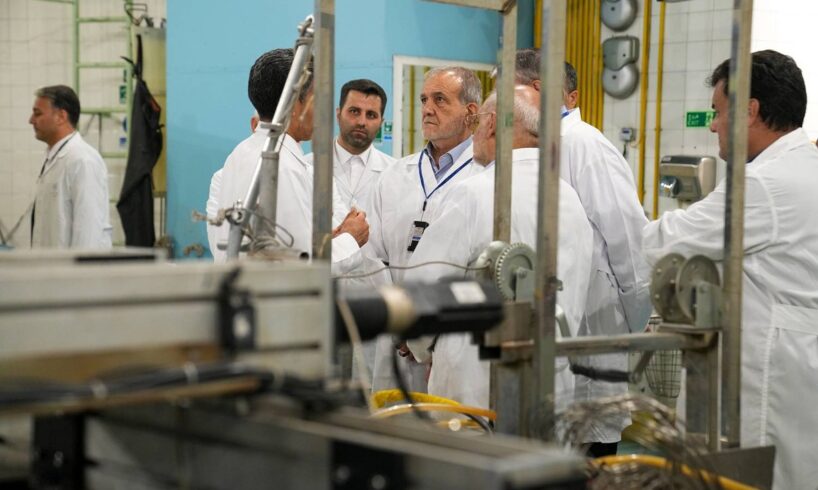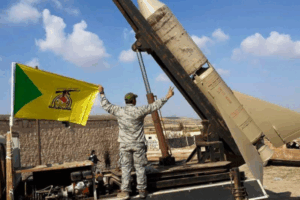
Another Israel-Iran war is “only a matter of time,” according to a report by The New York Times, which says Iran still has a stockpile of enriched uranium and is racing to build thousands of missiles.
The piece, published Sunday, casts doubt on the idea that the 12-day war between the countries in June eliminated the threat of Iran’s nuclear program. Rather, it says that Middle East officials and experts increasingly believe Israeli and US strikes caused less damage to Tehran’s nuclear facilities than previously thought, and that both countries are preparing for the prospect of another round of conflict.
“Iran’s stockpile of highly enriched uranium, enough to make 11 nuclear weapons, is either buried under rubble, as Iran claims, or has been spirited away to a safe place, as Israeli officials believe,” the report said.
Other factors make another war likely, the report said. Among them is an ongoing impasse between the United States and Iran, which engaged in several rounds of talks before the US joined Israel’s bombing campaign in June. In addition, the 2015 nuclear deal brokered between Iran, the US and European countries expired recently, triggering heavy sanctions on Iran.
Those factors, coupled with intensive Iranian work on a new enrichment site it refuses to give international inspectors access to, make many in the Gulf think that another Israeli attack is “almost inevitable,” the report added.
Get The Times of Israel’s Daily Edition
by email and never miss our top stories
By signing up, you agree to the terms
In preparation for the next war, Tehran has greatly increased its missile production, working around the clock in hopes of being able to “fire 2,000 at once to overwhelm Israeli defenses, not 500 over 12 days,” Ali Vaez, the Iran project director at the International Crisis Group, told the Times.
Israeli air defense systems are activated to intercept Iranian missiles over Tel Aviv amid a fresh barrage of Iranian rockets on June 16, 2025. ( Jalaa MAREY / AFP)
“Israel feels the job is unfinished and sees no reason not to resume the conflict, so Iran is doubling down preparedness for the next round,” Vaez said, adding, however, that there was no suggestion that any renewed fighting was imminent.
While there have been some attempts to revive talks on a new nuclear deal, they have yet to yield results, and last week, Iran’s Supreme Leader Ayatollah Ali Khamenei appeared to cast doubt on whether they would be able to progress any further.
“The Americans sometimes say they would like to cooperate with Iran. Cooperation with Iran is not possible as long as the US continues to support the accursed Zionist regime, maintains military bases, and interferes in the region,” Khamenei said in remarks transcribed by state media.
“The arrogant nature of the United States accepts nothing other than submission.”
Vaez told the Times that Iran’s top officials are divided over how to proceed amid the impasse with the US.
Some, he said, want to keep pursuing a new nuclear agreement with the US, believing that this will be better for Iran as the country’s roughly 92 million people face soaring inflation and severe water shortages.
But not everyone agrees, Vaez told the Times, and some would prefer another confrontation, believing it is futile to try and negotiate with Trump, who withdrew from the landmark 2015 nuclear agreement during his first term.
Regardless of preferred approach, Vaez said the top officials agree on one thing: That another round of fighting with Israel is inevitable.
A giant billboard depicting Muslim people walking with flags toward the Dome of the Rock shrine in Jerusalem is erected in Valiasr Square in the center of Tehran, October 25, 2023. (Atta Kenare / AFP)
In June, Israel said its sweeping assault on Iran’s top military leaders, nuclear scientists, uranium enrichment sites, and ballistic missile program was necessary to prevent the Islamic Republic from realizing its avowed plan to destroy the Jewish state.
Iran has consistently denied seeking to acquire nuclear weapons. However, it enriched uranium to levels that have no peaceful application, obstructed international inspectors from checking its nuclear facilities, and expanded its ballistic missile capabilities. Israel said leading up to the June war, Iran had taken steps toward weaponization.
Iran retaliated to Israel’s strikes by launching over 500 ballistic missiles and around 1,100 drones at Israel.
The attacks killed 32 people and wounded over 3,000 in Israel, according to health officials and hospitals. More than 1,000 people died in Iran.
In all, there were 36 missile impacts and one drone strike in populated areas of Israel, causing damage to 2,305 homes in 240 buildings, along with two universities and a hospital, and leaving over 13,000 Israelis displaced.
You appreciate our journalism
You clearly find our careful reporting valuable, in a time when facts are often distorted and news coverage often lacks context.
Your support is essential to continue our work. We want to continue delivering the professional journalism you value, even as the demands on our newsroom have grown dramatically since October 7.
So today, please consider joining our reader support group, The Times of Israel Community. For as little as $6 a month you’ll become our partners while enjoying The Times of Israel AD-FREE, as well as accessing exclusive content available only to Times of Israel Community members.
Thank you,
David Horovitz, Founding Editor of The Times of Israel
Join Our Community
Join Our Community
Already a member? Sign in to stop seeing this





